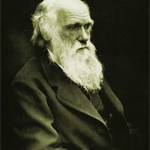
Joanne Manaster reviews two books about distinguishing science fact from science fiction in our everyday lives: Bad Science, by Ben Goldacre, and Lies, Damned Lies and Science, by Sherry Seethaler.
For more of Joanne's video reviews, see her web page, Joanne Loves Science, or her science reviews YouTube channel.
Animal control units are flocking to North Carolina's Research Triangle Park to aide in the struggle to contain a herd of approximately 50 'Dinochickens,' the dinosaur-like creatures constructed using chicken embryos and reverse evolution techniques. According to one of the researchers in the facility, one of the dinochickens was able to manipulate the locking mechanism on the master containment room by entering a number on a keypad, subsequently overpowering the researchers and allowing the herd to escape through a plate-glass window. The creation of the dinochickens was part of a project…
Originally posted by Grrlscientist
On March 27, 2009, at 10:59 AM
I have lived and worked with people whom I have decided, in retrospect, were more than merely hateful and mean-spirited, they were just plain evil. So when Barbara Oakley asked me to read and review her book, Evil Genes: Why Rome Fell, Hitler Rose, Enron Failed, and My Sister Stole My Mother's Boyfriend (Prometheus Books; 2008), I readily agreed. This well-written and very readable book is an exploration of evil people who exhibit an extreme form of Borderline Personality Disorder, which profoundly damages the lives of so many…
Originally posted by Janet Stemwedel
On March 26, 2009, at 11:58 AM
What is it like to be a woman scientist? In a society where being a woman is somehow a distinct experience from being an ordinary human being, the answer to this question can be complicated. And, in a time and place where being a scientist, being a professional -- indeed, even being American -- was still being worked out, the complexities of the answer can add up to a biography of that time, that place, that swirl of intellectual and cultural ferment, as well as of that woman scientist.
The astronomer Maria Mitchell was not…
Geologists have been keeping a close watch on the volcanic activity brewing at Mount Redoubt, the 9,000 foot (2,700 m) volcano found in Alaska's Aleutian Range. In response to the eruption at Redoubt on Thursday morning that released a 65,000 foot (20,000 m) ash column, the Alaska Volcano Observatory raised its Volcano Alert level to "Warning" and its Aviation Alert Level to "Red," both of which are the highest possible categorizations. ScienceBlogger Erik Klemetti from Eruptions is keeping close watch on Redoubt, so pop over to his blog for explosive updates!
Related ScienceBlogs Posts:…
Over the past three days, the Texas State Board of Education has heard over 50 testimonies debating a proposed amendment to reinstate the requirement of teaching the "strengths and weaknesses" of the theory of evolution in the statewide science curriculum. The proposed regulation, which has provided creationism a place in the classroom in the past, alarmed scientists not only for its potential repercussions in Texas, but because of the state's large textbook market as well, which forces textbook authors to bend to the state's curricula. To their relief, the bill failed this morning in a…
A new paper published in Genome Research provides the most comprehensive scan to date of the genetic signatures of natural selection resulting from the last 10-40,000 years of human evolution, with some intriguing results. The results show strikingly different patterns of selection in distantly related human populations, suggesting that different human groups have adapted to their environments in different ways. Many of the regions seen to be most subject to selection contain genes of unknown function—or no genes at all—but regions linked to increased risk of type 2 diabetes showed a…
Originally posted by David Dobbs
On March 23, 2009, at 9:34 AM
I've had mixed reactions to Gladwell's writing over the years: I always enjoy reading it, but in Blink, especially, when he was writing about an area I knew more about than in his other books, I was troubled not just by what seemed an avoidance of neuroscientific explanations of attention and decision-making, but by an argument that seemed to come down to "The best way to make decisions is the quick gut method, except when it's not." I was also troubled by ... well, I couldn't put my finger on it. But Joseph Epstein has:
Too…
Here's something new, ScienceBlogs Book Clubbers—hopefully the first of many. When we stumbled across Joanne Manaster's science book review channel on YouTube, we were riveted, and we thought you might be, too. We will be posting Joanne's videos here on an informal, ongoing basis, and we've listed her on our contributors page. Let us know what you think!
Originally posted by Janet Stemwedel
On March 19, 2009, at 4:39 PM
Scientists are not usually shy when it comes to voicing their frustration about the public's understanding of how science works, or about the deficits in that understanding. Some lay this at the feet of an educational system that makes it too easy for students to opt out of science coursework, while others blame the dearth of science coverage in our mass media.
Rather than casting about for a villain, cell biologist Frederick Grinnell has written a book that aims to help the non-scientist understand what scientific practice…
Jane Lubchenco and John Holdren were confirmed unanimously by the U.S. Senate Thursday night after being stalled since March 3, when their nominations were blocked by anonymous holds in the Senate for unrelated reasons. Lubchenco will serve as the administrator of the National Oceanic and Atmospheric Administration and John Holdren will take on the role of Science Adviser to President Obama. Throughout the ordeal, ScienceBlogger Mike Dunford was unrelenting in his efforts to bring this issue to the public's attention, contacting Capitol Hill to investigate the situation, reporting his…
Pope Benedict XVI provoked outrage amongst health officials last week when he stated that condoms were not the answer to Africa's fight against HIV and Aids, and could even worsen the problem. His comments came during the Pope's first visit to Africa, highlighting the Catholic Church's controversial stance which places a strong emphasis on sexual abstinence and fidelity to prevent the spread of disease. Professor Susan Wood, co-chair of the advisory committee for women's health, has indicated that the Obama administration is likely to reverse many of the Bush-era policies requiring…
Saturday, March 22, ScienceBlogs contributors reached the notable number of 100,000 blog entries on ScienceBlogs.com! Congrats to all of them for their hard work and dedication. Onward to one million!
ScienceBloggers Peter Lipson, AKA Dr. Pal from White Coat Underground, and Janet Stemwedel, AKA Dr. Free-Ride from Adventures in Ethics and Science, return for another episode of BhTV's Science Saturday this week. They discuss Senator Tom Harkin's worrisome crusade to "validate" alternative medicine, debate whether scientists should bother to rigorously investigate popular junk science, explain why doctors should exhibit humility in the face of disease, and issue a call for scientists to get political.
Related ScienceBlogs Posts:
Peter on Tom Harkin's war on science
Janet on conventional…
With print publications in crisis, the issue of how scientific information will be disseminated in the future has become a recurrent topic of discussion here on ScienceBlogs and all over the web. Recently, Ed Brayton of Dispatches from the Culture Wars criticized National Geographic and the "sorry state of popular science writing" because of an error in a story, to which Chris Mooney from The Intersection responded, pointing out that the economic situation print publications are forced to operate under should be considered in criticisms of the field. For Mooney, it's not errors he finds…
A recent influx of geobloggers on ScienceBlogs has brought rocks, mountains, and their fiery relatives volcanoes into the spotlight. Whether they're talking about unusual uses of earthquake jargon, volcanic eruptions in the South Pacific, or their fantasy geology curriculum for undergraduates, these bloggers stay down to earth. Remarked veteran ScienceBlogger Chris Rowan of Highly Allochthonous, "All the biomedical types around these parts should wake up and start realizing that the future is hammer-shaped."
Related ScienceBlogs Posts:
The "what should a geology major know" meme
New…
Originally posted by Brian Switek
On March 15, 2009, at 12:05 PM
Ancestors are important. We like to know where we came from and what sort of legacy our forebears left, but it has only been recently that we have been able to trace the concept of "ancestor" through the depths of geological strata. I may not know the detailed history of my family during the last hundred years or so, but I do know that a number of hominins figure into my family tree.
I am not proud or ashamed of this deeper ancestry which I share with every other Homo sapiens on the planet. It is simply historical fact, but I…
Originally posted by Grrlscientist
On March 14, 2009, at 10:59 AM
An ocean without its unnamed monsters would be like a completely dreamless sleep.—John Steinbeck, The Log from the Sea of Cortez (Penguin Classics; 1995).
Unlike any of the kids I grew up with, I was absolutely fascinated by sharks. Despite their bloodthirsty reputation, I saw them as elegant and beautiful creatures, although I never appreciated them as individual personalities. But when you read journalist Susan Casey's book, The Devil's Teeth: A True Story of Obsession and Survival Among America's Great White Sharks (Henry…
There are several misconceptions circulating about Charles Darwin and his revolutionary ideas and theories in the field of evolution. That's why, in honor of Darwin's birthday last month, ScienceBlogger John Wilkins from Evolving Thoughts took it upon himself to clear things up. In his eight-part series, "Myths about Darwin," Wilkins addresses and debunks claims such as those that paint Darwin as a social Darwinist or Lamarckian and sets the record straight.
Related ScienceBlogs Posts:
Myth 1: Darwin Did Not Believe in the Reality of Species
Evolving ThoughtsFebruary 10, 2009
Myth 2: Darwin…
March 14, we here at ScienceBlogs celebrated the universally important ratio of a circle's circumference to its diameter—the number that has now been calculated to over a trillion digits—the mythical, the irrational Pi. On this highly-regarded mathematical day, ScienceBloggers turned in their final submissions to the Pi Day Pie Bake-off Contest, in which ScienceBloggers were invited to submit a picture and recipe of their favorite home-baked pies by posting an entry on their blogs.
The contest is open until 10pm (EST) tonight, so if you haven't cast a vote for your favorite ScienceBlogs pie…


